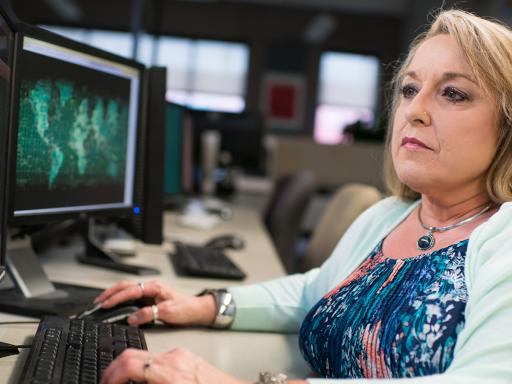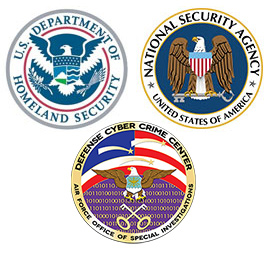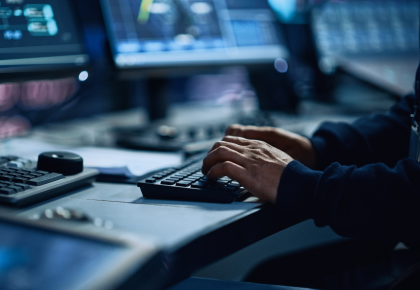Complete DFS-501
Summer term 1 begins. Apply by April 23, 2026.
Summer term 2 begins. Apply by June 18, 2026.
Fall term 1 begins. Apply by Aug. 13, 2026.
Explore Digital Forensic Science
Advance your career with a top-ranked, award-winning, and nationally recognized digital forensics education. Champlain's online master's in digital forensics degree develops students into scientists through an inspired, cutting-edge curriculum, closely aligned with emerging technology and new trends in the digital investigation industry.
A Nationally Recognized Leader in Digital Forensics
Champlain is a nationally recognized leader in cybersecurity and computer forensics education and home of the Senator Patrick Leahy Center for Digital Investigation & Cybersecurity. With a robust faculty of expert-practitioner instructors who have significant experience working for top organizations and are sought-after thought leaders in the field, we specialize in building agile cybersecurity and digital forensics programs that the meet mission-critical needs of today's private sector businesses, nonprofit organizations, law enforcement, and state and federal governments.
Champlain has been designated a National Center of Academic Excellence in Cyber Defense Education by the U.S. National Security Agency and the Department of Homeland Security since 2006, and Champlain cybersecurity programs have been named best in the nation by SC Magazine. Champlain was also designated as a National Center of Digital Forensics Academic Excellence by the Defense Cyber Crime Center (DC3) Air Force Office of Special Investigations - the fifth college in the nation to receive this distinction - until the program was paused by the Federal Government in Sept. 2025.
Build Your Career Future
Through this hands-on master's in digital forensics program taught by industry experts who are working for some of the leading organizations in the field, you'll learn how to gather and utilize digital evidence and apply investigative techniques to real-world incident response scenarios. With a focus on both technical expertise (including knowledge of over 34 scripting languages and cloud and software applications, listed below) and advanced professional skills such as leadership and communication, you'll be prepared to handle the complex demands of a career in the growing digital forensics field.
Program Curriculum
Champlain's online digital forensic science courses encompass the top skills needed by today's computer forensics professionals.
*Note: Some essential knowledge is required prior to admission to the MS DFS program. During your application process it will be determined if you meet all requirements. Students who meet all of them will be waived from CMIT 500 and DFS 500 and will earn a 30 credit Master of Science in Digital Forensic Science. Those who do not meet the requirements will have the opportunity to gain the knowledge they need by taking CMIT 500 and/or DFS 500 and will graduate with a 33-36 credit degree.
Students will develop an understanding of the components of information systems and their relationships by acquiring knowledge on a variety of foundational information technology and security topics, including computing hardware, operating systems, and applications and their development. Different types of networks, topologies, and protocols are covered in an accelerated fashion to prepare students for successful completion of their desired program(s) and analysis of basic network communications.
In this course, students will acquire explicit legal knowledge, particular computer and other digital device skills, and good oral and written forensic reporting abilities needed for successful completion of the Master's Degree. In this class students have the first contact with digital forensic software like FTK Imager, Autopsy, ProDiscover Basic, and OSForensics.
Students will be using FTK Imager, Magnet Encrypted Disk Detector, OS Forensics Volatility Workbench, Kali Linux, Reg Ripper, Network Miner, and Wireshark to develop a foundation framework for the practice of Digital investigations, including technical and managerial issues.
Students will develop the ability to write basic python scripts (WIngIDE) to help in digital investigations. Students will also interpret scripts written in other languages, like EnCase Enscript or Perl or Microsoft Powershell or UNIX Shell Script.
Prerequisites
Students will use tools such as The Sleuth Kit and Volatility to conduct forensic analysis of PC & server operating systems and software running on those systems, while gaining a knowledge set of forensic relevant information about operating systems, including those used in mobile devices. Finally, students will look at the challenges of virtualization, including those that come with the growth of Cloud systems.
Prerequisites
Complete DFS-501
In this class, students use tools like nfdump, Snort and Wireshark for network forensic analysis in the context of the role of an incident response team.
Prerequisites
DFS-520
This course will teach the concepts and techniques needed to preserve and analyze data on a range of mobile electronic devices, including mobile phones, tablets, eBook readers, and GPS systems. Some of the tools used in this course are Magnet Forensics Axiom, Access Data FTK Imager, EnCase, Cellebrite Physical Analyzer, DB Browser, and Andriller.
Prerequisites
DFS-520
In this class, students will assess and discuss the legal issues currently affecting the practice of digital forensics. Some of the highlights are the study of the following topics: “Cloud Act” and “Data Nationalism”; Supreme Court’s Efforts to Meet the Challenges of “Digital Evidence”; Encryption vs Privacy; and GDPR and the “Right to Be Forgotten.”
Prerequisites
DFS-501
The course introduces principles of digital investigations that are specific to civil litigation. While litigation support services typically utilize many of the same tools, processes, and procedures as public sector criminal investigations, private sector use of computer forensics frequently involves issues that the public sector does not often consider, such as data recovery and restoration, erasure of media, and electronic discovery. Students will examine case studies of public sector digital investigations to compare with private sector methodologies.
Prerequisites
Complete DFS-520
The capstone class is a natural conclusion to the work in the entire program. Students will approach in this class something in the digital forensic field that has not been fully developed yet and will develop and present a methodology for performing forensic investigation in a way that improves what is already known.
Prerequisites
Complete 24 credits
In this course, students gain an insight into malware behavior, including infection vectors, propagation and persistence mechanisms, and artifacts. Some of the used tools are Pescanner, Xorserach, Interactive Disassembler Professional (IDA Pro), Mandiant IOC Editor, Ollydbg, Windbg, FindCrypt2, Krypto ANALyzer (KANAL), Volatility.
Prerequisites
Complete DFS-520
While using tools like Kerberos, openPGP and WireShark, students will learn encryption and hashing algorithm techniques and develop basic understanding of encryption cracking techniques and methods to counter whole-disk encryption and network based encryption.
Prerequisites
DFS-501, DFS-520
In DFS-565, we discuss some of the challenges and decisions that confront managers, supervisors, and administrators in private and public lab environments. We will examine some of the special situations that professionals might encounter during digital forensics lab careers. This class is less focused on the technical aspects of digital forensics and more on some of the human aspects of managing people, making decisions, and managing administrative operations in the lab environment.
Prerequisites
Complete DFS-501
Additional Program Details
In addition to developing advanced communication and analytical skills, and a strategic mindset, graduates of the digital forensic science master's online program will demonstrate a mastery of the following industry-specific competencies:
- Evaluate the role of evidence management in forensic examination.
- Assess the legal issues affecting the practice of digital forensics.
- Develop software tools for the automation of data processing, manipulation, and analysis.
- Develop methodologies for the preservation and analysis of digital devices.
- Conduct the forensic analysis of a variety of digital devices and data
- Evaluate the efficiency and effectiveness of digital forensic methods, software, and hardware.
- Effectively communicate complex scientific topics in the digital forensics to both expert and lay audiences.
- Conduct independent research in the field of Digital Forensic Science.
- Outline the challenges and methods for addressing the challenges of leadership of digital forensic professionals.
- Access Data
- Andriller
- Autopsy
- Cellebrite Physical Analyzer
- DB Browser
- EnCase Encript
- FindCrypt2
- FTK Imager
- Interactive Disassembler Professional (IDA Pro)
- Kali Linux
- Kerberos
- Krypto ANALyzer (KANAL)
- Magnet Encrypted Disk Detector
- Magnet Forensics Axiom
- Mandiant IOC Editor
- Microsoft Powershell
- Network Miner
- nfdump
- Ollydbg
- openPGP
- OS Forensics Volatility Workbench
- Perl
- Pescanner
- ProDiscover Basic
- Reg Ripper
- The Sleuth Kit
- Snort
- UNIX Shell Script
- Volatility
- Windbg
- WIngIDE
- Wireshark
- Xorserach
Our admissions team seeks to admit students who:
- Hold a bachelor's degree from a regionally accredited institution.
- Demonstrate a solid academic foundation - a minimum 2.5 GPA is our recommendation, though exceptions may be made on a case-by-case basis for those who demonstrate a potential for academic success in other ways.
- Possess an aptitude for success in an online learning environment.
- Exhibit the ability to make a positive contribution to the Champlain College Online community.
- The GMAT and/or GRE are NOT required for admission into a Champlain online graduate program.
To learn more about submitting transcripts, or requirements for those educated abroad or returning students visit our graduate Admissions page.
Requisite Knowledge Requirement/Conditional Acceptance
In the application review process, all candidates for admission will be assessed for prior work experience and/or academic coursework that provides a solid foundation in the following areas:
- Information Technology, including computer networks and operating systems
- Digital forensic investigative techniques and laws
- Criminal/judiciary system
Acceptance to the program is limited to applicants who can demonstrate knowledge of at least one of the areas above. The number of required classes to complete the program is dependent on the demonstrated ability in all three areas.
Our transfer credit evaluation team works hard to ensure you get the transfer credits you deserve, from a variety of sources including prior college credits, work experience and training, military training and experience, and more. Our goal is to help you graduate from Champlain College Online as quickly and affordably as possible. Visit our Transfer Credit Options page to learn more.
Champlain College Online's computer science faculty, led by Department Chair Richard Pickering, are expert practitioners in the field. Their industry expertise ensures that our curriculum is aligned with the needs of employers, and reflects the skills today’s IT systems professionals need for success. Classes led by our seasoned experts will give you real-world insight into the world of information technology, and create a rich community of career-focused learning.
Tuition & Costs
Graduate Tuition Fall '25 - Summer '26
Tuition & Costs
Graduate Tuition Fall '26 - Summer '27
See the graduate cost of attendance and fees here
* Alumni is defined, for this tuition rate, as any degree program graduate from Champlain College or Champlain College Online.
** Veteran rate effective Spring 2025, not retroactive
Affordability and Paying For Your Education
We provide a number of options to make your online education affordable, including preferred tuition for alumni, associate degree graduates, community college graduates, and military.
Prepare For What's Next
As network breaches and digital crimes become more prevalent, the need for highly qualified digital forensics professionals is rapidly growing in organizations across all sectors, including mid- to large-sized corporations, crime laboratories, state and national law enforcement agencies, or large municipalities. With a valuable combination of technical skills, subject matter expertise and the critical professional skills needed in leadership roles, graduates of Champlain's online digital forensics master's degree program will be competitive candidates for a variety of roles in the field.
Master's degrees are in high demand and employment in master’s-level occupations is projected to grow by 15% from 2019 to 2029. A master's degree also pays off: the median salary for professionals with a master's degree is $78,210.*
*Sources: Bureau of Labor Statistics (BLS), 2020; job titles: BestColleges.com, 2020
What can you do with a masters degree in digital forensics?
- Computer Forensics Investigator
- Digital Forensics Examiner
- Digital Forensics Analyst
- Digital Forensics Consultant

Why Champlain
Transfer Credit
"Transferring credits to Champlain was very easy. The staff worked really hard with me to find not just credits from other institutions that I had attended, but also life credits from things I had accomplished, and from past certifications."

Academic Excellence and Recognition

Regionally accredited by the New England Commission of Higher Education

Designated as a Military Friendly School for our commitment to the military community
Ranked among the best by Tech Guide for game design and computer science

Named the among the best schools with accelerated bachelor's degrees by Intelligent.com
Meet the Program Director
Mauriella DiTommaso, MS, MBA
- Computer Forensics & Digital Investigations
- Digital Forensic Science
About
Mauriella DiTommaso is currently serving as the Chief Information Security Officer for the Washington State Department of Social and Health Services. With over two decades of experience, she excels in leading cybersecurity and digital forensics teams, developing comprehensive policies, and managing high-profile security incidents. Her role extends to Champlain College Online as a program director, adjunct faculty member and course developer.
Her diverse background includes positions such as Senior Manager for Cybersecurity and Digital Forensic Investigations Program Manager for the Washington State Economic Services Administration and as a Digital Forensic and Media Exploitation Specialist and Cryptologic Linguist with the U.S. Department of Defense. She holds a Master of Science in Digital Forensic Science from Champlain College, and an MBA from Delaware Valley University. Additionally, she is a GIAC Certified Forensic Examiner.
Mauriella enjoys trail and road running, spending time outdoors with her family, and volunteering in her community through various outlets. As a military veteran and spouse of an active-duty service member, Mauriella also enjoys supporting military families, their service members, and veterans through various opportunities.

Frequently Asked Questions
Following are a few frequently asked questions about the master of science in digital forensic science.
Absolutely! Credits from the graduate certificate in digital forensics transfer into this master’s program. You can also transfer up to 6 graduate credits from other institutions if they align with the program’s curriculum.
Yes! Active-duty military personnel receive preferred tuition rates. Find more ways to save on your program costs on our website.
Yes, it’s an accredited online MS degree program that allows for the flexibility and work-life balance that working professionals need.
You May Also Be Interested In
Get Your Digital Forensics Program Guide
Learn what you can expect from our online master's in digital forensics program.

Download Program Guide
I acknowledge that, by clicking the "submit" button, I am giving my express written consent to Champlain College and its representatives to contact me about educational opportunities via email, text, or phone, at the phone number above, including my mobile phone, using an automatic dialer, or pre-recorded message. Message and data rates may apply. I understand that my consent is not a requirement for enrollment, and I may withdraw my consent at any time.







